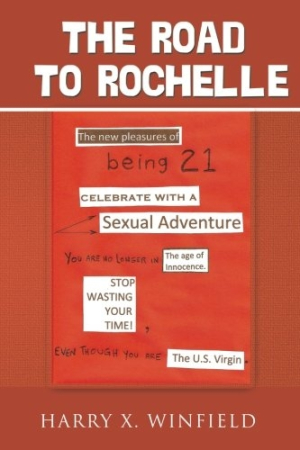The Road to Rochelle
Winfield’s The Road to Rochelle is a wry, ironic suburban novel.
Harry X. Winfield’s The Road to Rochelle is a cherchez-la-femme story that features a successful and upper-class professional, Eddie Hughes, who, after his retirement, becomes obsessed with his former, and fleeting, college girlfriend GV, even after almost forty years.
Eddie is very vocal about his bourgeois successes to friends and others. These include houses he has built, the achievements of his children, and trips to pleasant locales. When he reconnects with GV after an identity crisis, his life falls apart. Eddie stalks GV with multiple offers to visit, but when he crosses the line by phoning her son, she orders him to stay away from her and her family.
The plot confuses and rehashes itself, perhaps because of the arbitrary nature of its temporal setting. The setting bounces from 1957 to 2013, then to 1968, 2011, 1971, only to return to 1957 to start all over again. It tracks Eddie’s failed relationships, traumatic personal history, and reconnection with GV, who becomes kind of a psychological savior. This nonlinear narrative means that events don’t always unfold clearly, and the form makes Eddie’s character less sympathetic. He reads as arrogant as he flounders his way through his new life.
The book embodies a hybrid genre; it purports to be a novel but reads more like a memoir for its first half. Its second half is a swifter and cleaner read, thanks to an extended e-mail exchange between Eddie and GV that tracks his breakdown. He increasingly intrudes into her life, even though they both have long-standing marriages with adult children.
The book is packed with dense prose without any dialogue whatsoever, making it difficult to read. A more casual and colloquial series of emails compensates for this absence of discussions, however. Details that serve to construct Eddie’s upper-middle-class world also assist in the story’s comprehension.
The conclusion reads as if it is part of another story. After the book deals with sensitive issues—such as Eddie’s disabled brother’s drowning, Eddie’s molestation as a child by a scoutmaster, and his virtual and actual stalking of GV—the ending seems to forget its important plot threads, instead making light of Eddie’s inability to restrain himself when it comes to GV.
The Road to Rochelle is a wry, ironic suburban novel with an atypical plot progression and a loose ending.
Reviewed by
Philip J. Kowalski
Disclosure: This article is not an endorsement, but a review. The publisher of this book provided free copies of the book and paid a small fee to have their book reviewed by a professional reviewer. Foreword Reviews and Clarion Reviews make no guarantee that the publisher will receive a positive review. Foreword Magazine, Inc. is disclosing this in accordance with the Federal Trade Commission’s 16 CFR, Part 255.

